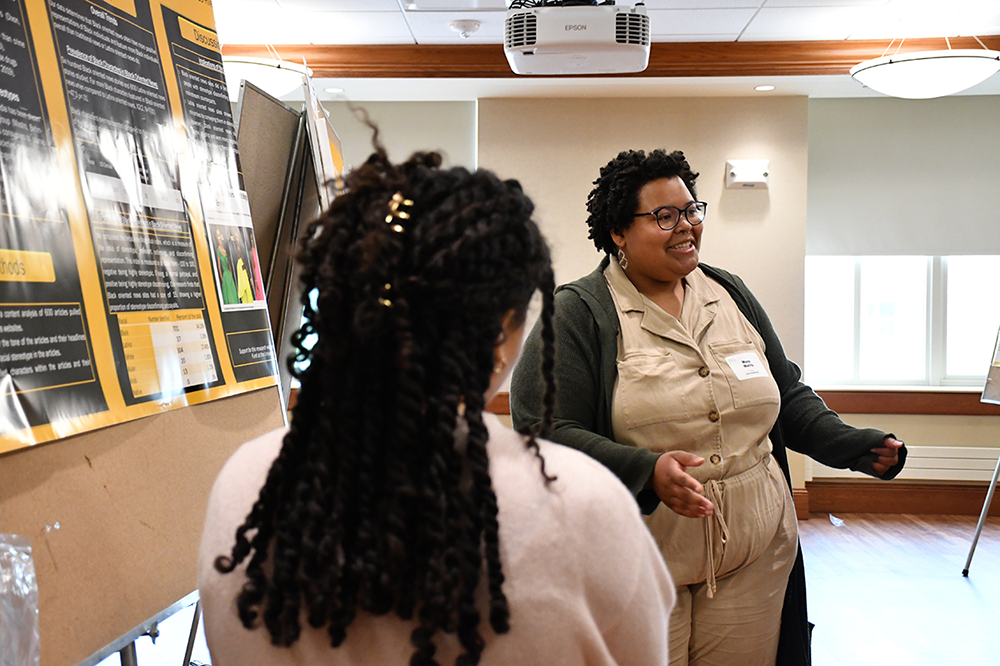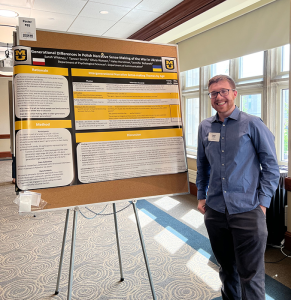
The Minority Focused News as a Locus of Empowerment research team investigates the manners in which news websites and streaming platforms that serve under-represented and marginalized populations provide a benefit to society. Undergraduate students at the University of Missouri who participate in the research seek to understand how identity-focused content serves as a safe space for those affected groups.
The original research was born out of work that Chris Josey, an associate teaching professor of communication at MU, started as a graduate student at the University of Illinois. Josey, who helps lead the team at Mizzou, conducted research on how marginalized groups are represented by mainstream news media. He soon learned that there wasn’t much research on news organizations that directly serve under-represented populations.
While the project was paused as Josey completed his Ph.D. and began his teaching career at MU, the ASH Scholars Program at Mizzou gave him the perfect opportunity to restart similar work.
“I had already been working with undergraduate students on independent research, so the opportunity to join the ASH Scholars Program was fantastic,” Josey said. “We were able to quickly establish that cycle of peer mentorship, which is really a big part of the program.”
Team research programs based in the arts, social sciences and humanities (ASH) disciplines, ASH Scholars receive a $3,000 scholarship, disbursed in four equal parts over the academic year. The ASH Scholars Program is a collaboration between the Honors College and the MU Office of Undergraduate Research. While the Honors College plays an important role in the program, students do not have to be pursuing the Honors Certificate to participate. Students of all academic majors and grade levels are invited to get involved.

“I’m incredibly passionate about this program,” Josey said. “I’m thrilled that Mizzou offers something of this nature. We need more opportunities like this, honestly, as it’s so important to our students.”
Students on the team take on a variety of tasks and play multiple roles. Many of the newer students analyze the content contained on these identity-focused sites using electronic recording software. Other students help design experimental tests of the content on cognition or perform statistical analyses of both the content and the surveys they conduct. The team is also in the beginning stages of interviewing content creators and providers.
“We have a wide range of roles and students often move from one role to another as they gain more training and seniority,” Josey said. “Seeing the students grow is definitely one of the most gratifying parts of the project. It’s great to empower the students and help them build confidence as they move forward in their studies.”
Students also read numerous articles and discuss their findings. Data entry is a very important part of the work, too. There are ample opportunities for students to present their findings as well, through conferences and forums.
“The students have definitely taken the work and run with it,” Josey said. “They are doing such innovative research. That’s one of the great things about working with undergraduate students. They see a need and work hard to fill it.”
Josey originally worked with Andrea Figueroa-Caballero when the team began in 2019. Figueroa-Caballero was an assistant research professor of communication at Mizzou for nearly four years before moving on to a new role last year. Julius Riles, an associate professor of communication, joined the team last year and continues to help lead the project.
“The project has evolved a bit over the years,” Josey said. “Julius has come in and helped expand the scope of the research. It’s been really exciting to have him on board.”
Josey said that it’s been important to have students from multiple disciplines participate in the project. He said bringing in those different perspectives and skillsets has been vital for the team.
“We’re blessed to have this program at Mizzou,” Josey said. “It’s great to have leadership who is committed to what we’re doing. The work that each team is doing is valuable. I think it’s one of the coolest programs on campus, and it’s inspired me to get more involved with undergraduate research. I want to help students find these outstanding experiential learning opportunities.”